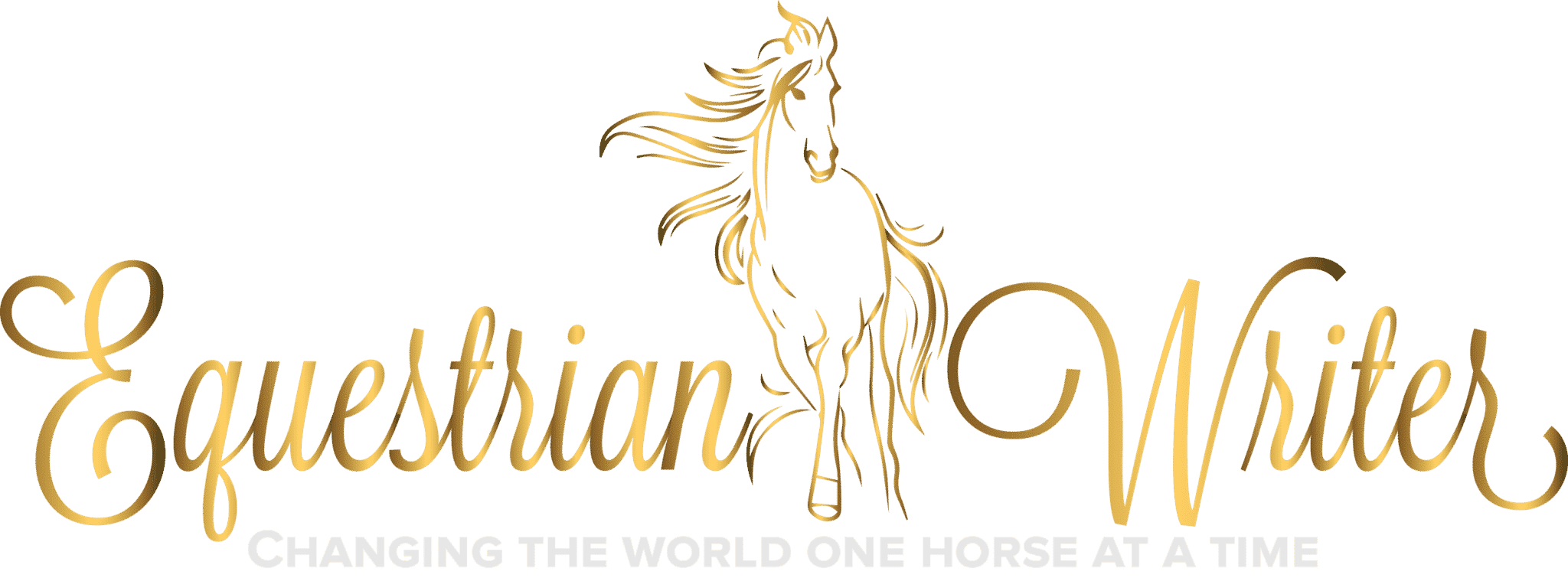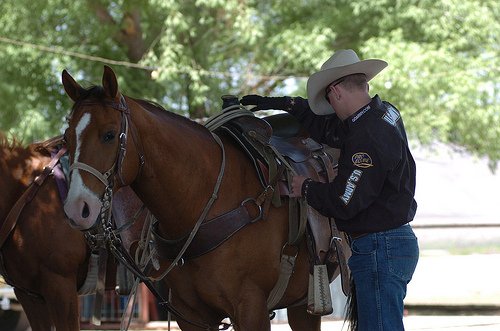
It is common to hear horse owners talking about their “bond” with their horse. Some see “bonding” as a sort of mystical art that is the pinnacle of horsemanship while others dismiss it as hogwash. In reality, it is neither.
What is bonding?
Bonding is an essential part of the horse-rider relationship. But bonding is not about blankets, treats, and cuddles. That’s spoiling. There is a big difference. The bond between horse and rider is built on trust and respect. Horses are hardwired to trust and respect a strong leader. A strong leader knows how to take control. It’s about being strict, but fair.
Horses are much like children in the fact that they need rules and structure. They are happiest when they have a structured environment where they know their place and what is expected of them. The boundaries are clear and rules are strictly enforced. Bonding isn’t about becoming friends with your horse. It’s about giving your horse the structured environment he needs. You are fulfilling more of a teacher or parent role than that of a friend.
Many people see the bond that I have with Moose and want to know how to emulate it. Moose will do anything I ask her to and go anywhere I ask her too, no matter how much it might go against her natural instincts. She trusts me to never lead her astray. But she does not trust me so whole heartedly because we are friends.
Our relationship isn’t cuddly. We spend time together outside of work, so to speak. I groom her and hand graze her. That’s about it. I love her to death and she will go to the ends of the earth to take care of me when I’m in the saddle. She’s my work partner, student, and the closest thing I have to a child. But she’s not a pet and we’re not friends. That’s just not how we function. I show her affection and she sometimes returns it in her own way. But, she is a problem child who is very high functioning and needs very strict rules and structure. The same people who want to emulate the bond I have with Moose look at all the rules I have to enforce with her and say: “I couldn’t do that, I would feel mean.”
Therein lies the problem.
[click_to_tweet tweet=”Bonding isn’t about love and cuddles. It’s about leadership. Without leadership, a bond cannot form. #horses #247equestrian” quote=”Bonding isn’t about love and cuddles. It’s about leadership. Without leadership, a bond cannot form.”]
Why is bonding important?
In the wild, the herd’s survival depends on having a strong leader and the rest of the herd following orders without question. If the herd leader gives the order to run and the herd stops to argue, they’re dead. The predator is already upon them. There is no time for the leader to explain “hey guys, there’s a mountain lion coming. I saw it. I know it’s there. Do you all agree that we should run?” The herd leader just says “run” and the herd listens.
Despite many horses being domesticated for generations, these instincts still remain. If you do not take control, they will elect themselves as leader. It is their survival instinct. This is where a lot of owners go wrong. They think they need to be their horse’s friend. But being your horse’s friend puts you on the same level as you horse. In order to provide him with the structure he needs, you need to put yourself in a position of authority as a teacher or parent.
How to start forming a bond with your horse
There is no set formula, but the biggest key is being a strong leader and I have found that being a strong leader involves focusing on the little things.
- Don’t let your horse play mind games
- The “you can’t catch me” game is a favorite in the pasture. Set your horse up to suffer natural consequences. For Moose, she loves to work. When she plays that game, I walk away and take one of her herd mates out of the pasture to ride. If that doesn’t work I remove the entire herd from the pasture until she lets me catch her. That gets her every time. I never chase her because that’s what she wants.
- Don’t let your horse crowd your personal space when standing or leading
- Don’t let your horse call the shots
- Hand grazing? Don’t let your horse pull you along
- Leading? Don’t let your horse snatch bites of grass without permission, lag too far behind, or barge ahead
- Standing tied? Every time your horse turns his attention away from you, bring his attention back. Don’t let him stare off away from you
- Don’t let your horse choose to walk away from you in the pasture, the leader is the one to end the interaction
- Don’t move out of your horse’s way, make him move out of yours (unless you are in legitimate danger, safety first)
- Patience is a virtue. Remember, the leader always wins
These are just a few of the little things you should practice. Above all, you need to remember that bonding isn’t about love and cuddles. It’s about training and leadership.










I have a young marwari colt and he’s my first horse.he is just one year old. he was gentle. easy to control and I was so friendly to him.
But now he is very aggressive and hard to control.
I hope this methods will be affective
Thank you very much for this article.
Thank you very much for this article. I have a young marwari colt and he’s my first horse.he is just one year old. he was gentle. easy to control and I was so friendly to him.
But now he is very aggressive and hard to control.
I hope this methods will be affective
This is a great article. I am a new horse owner and rescued an off the track Thoroughbred who’s injured. He’ll never be able to be ridden heavily but my goal is to walk around the arena with him. He’s a good horse but I definitely feel he doesn’t respect me. If I ask him to do things he doesn’t want to do, he rears and it terrifies me. What should I do? Yours sincerely Lauren.
Hi Lauren,
If you have a horse that is rearing and you are afraid of him, my best advice is to find a trainer or at least someone with more experience. I can give you all the advice in the world, but this type of horse is dangerous to you and himself. This is not something that can be solved over the internet. Until you can get help, my advice is to try and analyze why he is rearing. Here are a few articles I’ve posted in the past that may help you better understand how your horse’s brain works and maybe help you pinpoint what is going wrong:
https://equestrianwriter.com/blog/2018/12/06/silence/
https://equestrianwriter.com/blog/2018/03/15/the-mechanics-of-rearing/
https://equestrianwriter.com/blog/2018/04/04/habitation-vs-desensitization/
https://equestrianwriter.com/blog/2018/12/18/pressure-release-training/
Again, I strongly recommend that you work with a trainer, but hopefully, this is enough to get you started.
Alexi
Awesome! I love this and couldn’t agree more! I like the part about not letting your horse walk awY from you, that you need to be the one to end the interaction. Thanks for posting!
Thank you for this article. I have a young Arabian colt whose mother died during the drought we are having. My husband got him for me as my first horse. I suspect he is about seven months old. He was never handled by people before, but I got him halter trained so far. I focus a lot on groundwork – can’t ride him yet until he is old enough – but the more I read up about bonding and working with horses, I realise more and more that being his leader and being strict is very important. I will certainly keep this article in mind when working with him. I also want that special bond with him. Thank you very much.
I thank you so much for writing this. I am 5’2”, 67 and own a 16H 1500 pound Gypsy Vanner who is very smart and strong-willed (like a pony only huge). I have found that we get along best and I am safest if I never let him be the leader. He is calmer and even much more responsive under saddle. He was bred and brought up used to having a chain across the noseband. It doesn’t freak him out in the least. He also loves to lick my hand and naturally wants to be near me. I had to get over the whole totally positive reinforcement thing in order to keep him and most importantly me, safe. I reasoned that in the herd, horses don’t say please move away, they say MOVE!, at least the leaders do, and he is the low man in his group. Thank you again!
You’re very welcome! I’m so glad I could help. Your horse sounds like a sweetheart. 🙂